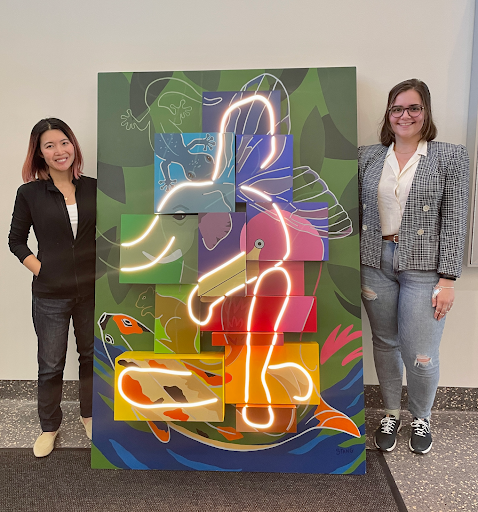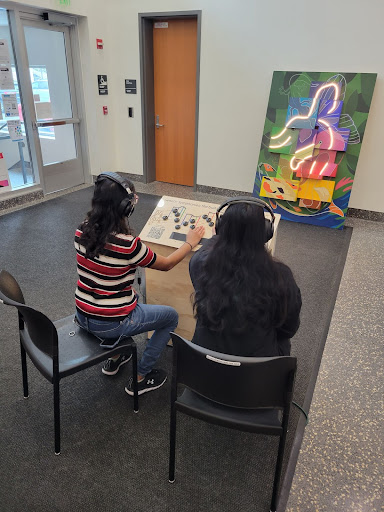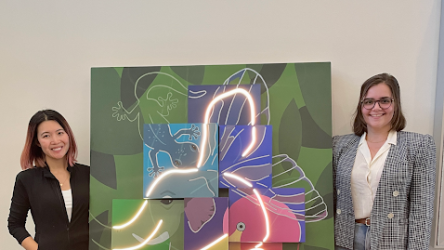
In the intricate symphony of life’s development, there exists a genetic composer. The Hox gene family orchestrates the breathtaking diversity of forms we see in the natural world, from the elegant curve of a swan’s neck to the delicate fingers of a pianist. UW-Madison graduate students and Marie Christine Kohler Fellows Katharine Hubert and Sharon Tang have created an interactive Art+Science fusion exhibit that opens up the captivating world of Hox genes.
“Genetic Symphonies: The Building Hox of Life” conveys developmental biology concepts using light and sound. To reflect the pivotal role of Hox genes in embryonic development, this multimodal exhibit uses 13 painted building blocks to represent the 13 groups of mammalian Hox genes. The blocks are controlled by 13 respective buttons on an accompanying podium. Because Hox genes must be activated in a specific order for development to occur, viewers must figure out the correct sequence for pressing the buttons. When pressed in the correct order, the buttons switch on the exhibit’s light and sound.
Katharine and Sharon conceived and created the exhibit as part of the Marie Christine Kohler Fellowship at the Wisconsin Institute of Discovery (WID). The fellowships foster an interdisciplinary community that creates content fusing science and art. Katharine (Kat) is a composer and patient-scientist in the 5th year of her Genetics Ph.D. Her artistic interests and passion for scientific research are fueled by her experiences living with her own genetic condition, experiences she hopes can help to fill gaps in scientific knowledge. Kat has established herself as a leader in disability advocacy within STEM, creating accessible lab equipment and advocating for inclusive and accessible practices, some features of which can be found in this exhibit.
A mural artist and scientist in the 5th year of her Cellular and Molecular Biology Ph.D., Sharon uses her background in education to create public art encouraging viewer-led experiences of discovery. Passionate about distilling complex concepts into digestible access points, Sharon believes art can connect people to content and spaces they might otherwise find unapproachable. She hopes to continue creating interdisciplinary projects that facilitate science engagement via informal, exploratory learning.
“Genetic Symphonies” invites the public into an experience where science and art converge. Artistic tools encourage public connection with scientific concepts like hox gene expression & developmental biology). The scientific process of experimentation shapes the creative process by which the fellows produced this work, which itself turns a significant scientific concept into an accessible learning experience.
“Both Sharon and Kat have been outstanding stewards of the Kohler Fellows program and ethos. Their exhibition reflects an incredible amount of hard work and dedication that would not be possible without a strong foundation of support,” says Andrew Hanus, Director of the Illuminating Discovery Hub at WID and the manager of the Kohler Fellows. “We are so incredibly proud of them and what they’ve accomplished.”
The exhibit will move around the UW–Madison campus for this academic year (see below). The Fellows are also working with Life Sciences Communication faculty Dr. Nan Li to integrate a survey tool into “Genetic Symphonies” so they can learn how users interpret and experience the scientific information and art through this exhibit.

Many thanks to the Kohler Foundation, the Wisconsin Institute for Discovery, and the University of Wisconsin-Madison Makerspace, with special acknowledgements to Matthew Mabee, John Lombardo, and Tim Steis for fabrication guidance, Deneen Wellik for scientific consultation, and Yash Wani and Ryan D. Ward for coding assistance. Lastly, thank you to faculty advisors Dr. Deneen Wellik, whose research data helped to inform this project, and Dr. Wilmara Salgado-Pabón.
Traveling Exhibit Schedule:
| September 2023 | UW Genetics |
| October-November 2023 | Steenbock Library |
| December 2023-January 2024 | UW Engineering |
| February-March 2024 | Helen C. White (college) library |
| April-May 2024 | WEI |
–Andrew Hanus, Director of the Illuminating Discovery Hub


You must be logged in to post a comment.